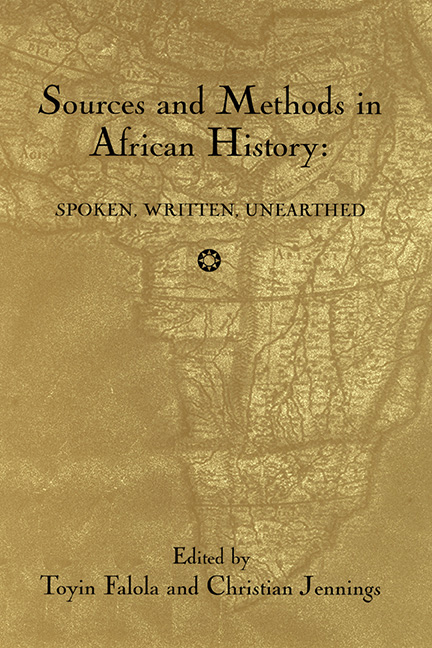Book contents
- Frontmatter
- Dedication
- Contents
- Acknowledgments
- Introduction
- Part I Archaeological Sources
- Part II Africa and the Atlantic World
- Part III Documentary Sources
- Part IV Oral Tradition
- 14 Section Introduction: Oral Tradition: Classic Questions, New Answers
- 15 Narratives on Pilgrimages to Mecca: Beauty versus History in Mande Oral Tradition
- 16 Kingship and the Mediators of the Past: Oral Tradition and Ritual Performance in Nupeland, Nigeria
- 17 Passages in a Struggle over the Past: Stories of Maji Maji in Njombe, Tanzania
- 18 Maisha: Life History and the History of Livelihood along the TAZARA Railway in Tanzania
- Part V Innovative Sources and Methods
- Contributors
- Index
14 - Section Introduction: Oral Tradition: Classic Questions, New Answers
from Part IV - Oral Tradition
Published online by Cambridge University Press: 25 October 2017
- Frontmatter
- Dedication
- Contents
- Acknowledgments
- Introduction
- Part I Archaeological Sources
- Part II Africa and the Atlantic World
- Part III Documentary Sources
- Part IV Oral Tradition
- 14 Section Introduction: Oral Tradition: Classic Questions, New Answers
- 15 Narratives on Pilgrimages to Mecca: Beauty versus History in Mande Oral Tradition
- 16 Kingship and the Mediators of the Past: Oral Tradition and Ritual Performance in Nupeland, Nigeria
- 17 Passages in a Struggle over the Past: Stories of Maji Maji in Njombe, Tanzania
- 18 Maisha: Life History and the History of Livelihood along the TAZARA Railway in Tanzania
- Part V Innovative Sources and Methods
- Contributors
- Index
Summary
Oral tradition, apart from being a source and resource for research on the African past, has a long history of its own in the historiography of the continent. The conventional narrative would hold that when faced with a dearth of written documentation representing “African points of view,” the elders of African historical studies, like the ancestors of the Dogon, turned to the Word. Indeed this search for an “authentic” African history led the author to The University of Wisconsin in the 1970s, the decade after Wisconsin professor Jan Vansina published his classic Oral Tradition: A Study in Historical Methodology. Similar efforts in Africa around the same time led African historians to collect and publish compendia of oral traditions, which, it was hoped, would provide a counterpoint to written documents— archives, memoirs, and ethnographical studies—associated with and tainted by European colonialism. Volumes such as B. A. Ogot's A History of the Southern Luo indeed shed much new light on the history of African societies. Space does not permit an essay here on the historiography of oral tradition in African studies; nor is this an appropriate place for such an undertaking. It is important to say, however, that the four chapters on oral tradition that make up this part of the collection are both descended from, and worthy of, the ancestral studies that preceded them.
The four chapters of this section fall into two pairs, each of which examines a related set of topics. The first pair, by Jan Jansen and Constanze Weise, focus on West Africa. They demonstrate in surprisingly concrete ways how historians and other social scientists may arrive at valid understandings of precolonial history through the careful analyses of oral traditions written down in the relatively recent past, contemporary narratives, ritual and performance, artifacts, and sites of memory. While being ever attentive to the questions of context and situation raised by postmodern and post-colonial studies over the last decade or so, they insist on, and show, that empirical knowledge of the African past may be derived from close analysis of oral texts and cultural forms associated with them.
In his provocative essay entitled “Narratives on Pilgrimages to Mecca: Beauty versus History in Mande Oral Tradition,” Jan Jansen reviews several prominent scholars in the American tradition of Mande ethnography, suggesting that their work displays “obscuring tendencies” in the historical analysis of oral narratives.
- Type
- Chapter
- Information
- Sources and Methods in African HistorySpoken Written Unearthed, pp. 239 - 248Publisher: Boydell & BrewerPrint publication year: 2003



